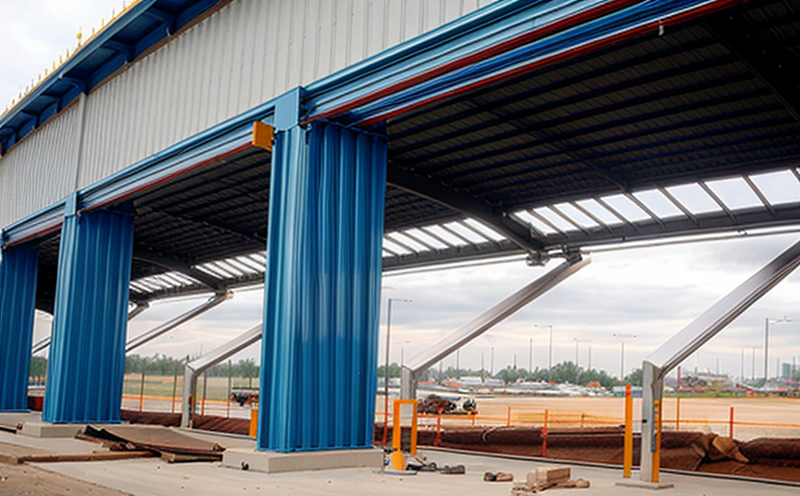Verifying the suitability of materials used for structural support in bending applications
The Crucial Step in Ensuring Structural Integrity Verifying Material Suitability for Bending Applications
As a business owner, you understand the importance of selecting materials that can withstand various environmental and operational demands. When it comes to structural support systems, bending applications pose unique challenges that require careful consideration. One critical factor is verifying the suitability of materials used in these situations. This laboratory service, provided by Eurolab, ensures that your chosen materials meet the necessary standards for safety and performance.
In this article, well delve into the significance of verifying material suitability for structural support in bending applications, highlighting its advantages and key benefits.
Why Material Suitability Verification is Essential
Bending applications involve significant stress on materials, which can lead to material failure if not properly designed or selected. This can result in costly repairs, downtime, and even accidents. By verifying the suitability of your chosen materials, you can
Ensure compliance with industry standards and regulations
Minimize the risk of material failure and associated consequences
Optimize structural support systems for improved performance
Reduce waste and associated costs through informed material selection
Advantages of Verifying Material Suitability
Eurolabs laboratory service offers numerous benefits to businesses, including
Enhanced Safety By verifying material suitability, you can ensure that your structural support systems meet the necessary safety standards, protecting people and assets.
Improved Performance Suitable materials enable optimal performance in bending applications, reducing the risk of failure and associated downtime.
Cost Savings Verifying material suitability helps you avoid costly repairs, replacements, or even litigation resulting from material failure.
Compliance with Regulations Eurolabs laboratory service ensures compliance with relevant industry standards and regulations, mitigating potential risks and consequences.
Key Benefits
Some of the key benefits of verifying material suitability for structural support in bending applications include
Reduced Material Waste Informed material selection minimizes waste and associated costs.
Increased Durability Suitable materials withstand stress and environmental conditions better, extending the lifespan of your structural support systems.
Enhanced Customer Satisfaction By ensuring compliance with industry standards, you can build trust with customers and stakeholders.
Competitive Advantage Demonstrating a commitment to safety, performance, and regulatory compliance sets your business apart from competitors.
How Eurolabs Laboratory Service Works
Our laboratory service is designed to provide businesses with accurate and reliable information about material suitability. The process involves
Material Sampling Collecting representative samples of the materials used in your structural support systems.
Testing and Analysis Conducting a range of tests, including mechanical properties (tensile strength, yield strength, etc.), chemical composition, and microstructure analysis.
Data Interpretation Expert analysis and interpretation of test results to determine material suitability for bending applications.
QA Frequently Asked Questions
What types of materials can be tested?
Metals, alloys, polymers, composites, and other materials used in structural support systems.
How long does the testing process take?
Results typically available within 2-4 weeks, depending on the complexity of tests and analysis required.
Can Eurolab provide certification for compliance with industry standards?
Yes, our laboratory service includes certification to relevant industry standards, ensuring your business meets regulatory requirements.
What are the benefits of partnering with Eurolab for material suitability verification?
Reduced risk, improved performance, cost savings, and enhanced safety among others.
Conclusion
In conclusion, verifying the suitability of materials used in structural support systems is an essential step in ensuring safety, performance, and compliance with industry standards. By partnering with Eurolabs laboratory service, businesses can minimize risks associated with material failure, optimize system performance, and reduce waste and costs. Take the first step towards mitigating potential consequences by scheduling a test today.
At Eurolab, we are committed to providing accurate, reliable, and expert services that meet your unique business needs. By choosing our laboratory service, youll not only ensure structural integrity but also gain peace of mind knowing that your chosen materials can withstand the demands of bending applications.
Insert call-to-action Schedule a test today
-
Testing the ability of materials to withstand bending forces without breaking
-
Simulating the effects of bending and flexing on construction materials under load
-
Evaluating the resistance of materials to deformation and failure when subjected to flexural stress
-
Testing for the maximum bending load that materials like concrete, metal, and composites can withstand
-
Ensuring that structural elements, such as beams and slabs, maintain their integrity when subjected to bending forces
-
Simulating conditions in which materials will bend under load and testing for any cracks or fractures
-
Ensuring that materials used in walls, floors, and ceilings maintain their strength under bending stress
-
Testing how materials react when subjected to bending in different environmental conditions, such as heat or moisture
-
Simulating the bending behavior of materials used in high-stress applications like bridges and highways
-
Evaluating the performance of materials used for flooring and roofing under bending conditions
-
Testing the flexural strength of materials used for insulation and soundproofing in construction
-
Verifying that the flexibility of materials like plastics and composites does not affect their overall strength
-
Simulating scenarios where bending forces are applied repeatedly to determine long-term durability
-
Testing how the shape and design of a material influence its resistance to bending or flexural forces
-
Ensuring that materials in construction retain their structural properties under bending stress over time
-
Verifying the strength and reliability of materials used in lightweight and modular construction
-
Testing for the ability of materials to return to their original shape after being bent (elasticity)
-
Evaluating materials for flexibility without compromising structural integrity or safety
-
Testing for bending failure, including cracking, warping, or twisting, under excessive load
-
Ensuring that building materials can resist bending deformation caused by shifting or settling foundations
-
Simulating real-world bending conditions, such as bending from wind or seismic forces, to test material resilience
-
Testing for the ability of materials to support heavy loads without losing their shape or structural performance




